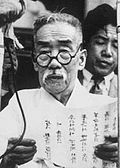| ||||||||||||||||||||||||||||||||||||||||
Presidential election | ||||||||||||||||||||||||||||||||||||||||
| ||||||||||||||||||||||||||||||||||||||||
| ||||||||||||||||||||||||||||||||||||||||
Vice presidential election | ||||||||||||||||||||||||||||||||||||||||
| ||||||||||||||||||||||||||||||||||||||||
| ||||||||||||||||||||||||||||||||||||||||
Presidential and vice presidential elections were held in South Korea on 5 August 1952. [1] The result was a victory for Syngman Rhee, who won 74.6% of the vote. Voter turnout was 88.1%. [2] The election was held during the Korean War, which played an important role in consolidating Rhee's support.








